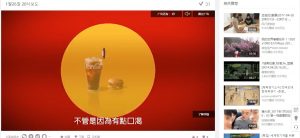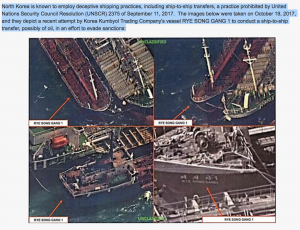By Benjamin Katzeff Silberstein
As the Winter Olympics with all its inter-Korean contacts wind down, the US is preparing to place Coast Guard forces to stop and search vessels in Asia-Pacific waters, to prevent North Korean sanctions circumvention. Reuters:
Washington has been talking to regional partners, including Japan, South Korea, Australia and Singapore, about coordinating a stepped-up crackdown that would go further than ever before in an attempt to squeeze Pyongyang’s use of seagoing trade to feed its nuclear missile program, several officials told Reuters.
While suspect ships have been intercepted before, the emerging strategy would expand the scope of such operations but stop short of imposing a naval blockade on North Korea. Pyongyang has warned it would consider a blockade an act of war.
The strategy calls for closer tracking and possible seizure of ships suspected of carrying banned weapons components and other prohibited cargo to or from North Korea, according to the officials, who spoke on condition of anonymity. Depending on the scale of the campaign, the United States could consider beefing up the naval and air power of its Pacific Command, they said.
The U.S.-led initiative, which has not been previously reported, shows Washington’s increasing urgency to force North Korea into negotiations over the abandonment of its weapons programs, the officials said.
North Korea may be only a few months away from completing development of a nuclear-tipped missile capable of hitting the U.S. mainland, despite existing international sanctions that, at times, have been sidestepped by smuggling and ship-to-ship transfers at sea of banned goods, according to officials.
“There is no doubt we all have to do more, short of direct military action, to show (North Korean leader) Kim Jong Un we mean business,” said a senior administration official.
The White House declined official comment.
The effort could target vessels on the high seas or in the territorial waters of countries that choose to cooperate. It was unclear, however, to what extent the campaign might extend beyond Asia.
Washington on Friday slapped sanctions on dozens more companies and vessels linked to North Korean shipping trade and urged the United Nations to blacklist a list of entities, a move it said was aimed at shutting down North Korea’s illicit maritime smuggling activities to obtain oil and sell coal.
Tighter sanctions plus a more assertive approach at sea could dial up tensions at a time when fragile diplomacy between North and South Korea has gained momentum. It would also stretch U.S. military resources needed elsewhere, possibly incur massive new costs and fuel misgivings among some countries in the region.
The initiative, which is being developed, would be fraught with challenges that could risk triggering North Korean retaliation and dividing the international community.
China and Russia, which have blocked U.S. efforts at the United Nations to win approval for use of force in North Korea interdiction operations, are likely to oppose new actions if they see the United States as overstepping. A Chinese official, speaking on condition of anonymity, said such steps should only be taken under United Nations auspices.
China’s Foreign Ministry, in a statement to Reuters, said they did not know anything about the plan, but that in principle China believes U.N. resolutions on North Korea should be fully and thoroughly implemented.
“At the same time, we hope relevant countries act in accordance with Security Council resolutions and international law,” it added, without elaborating.
Full article:
Exclusive: U.S. prepares high-seas crackdown on North Korea sanctions evaders – source
Phil Stewart, David Brunnstrom
Reuters
2018-02-23
I won’t go into the strategic and political implications, but when it comes to sanctions circumvention, a plan like this, thoroughly executed, would likely raise the costs of North Korean sanctions circumvention. Even with what sanctioned trade still goes on, there’s likely a substantial premium charged by traders that deal with North Korea because of the risks involved. As those risks go up, so should the premium. No measures can make circumvention fully impossible, but it can get a whole lot more expensive.


